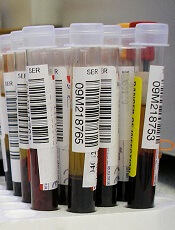
Photo by Graham Colm
A new technique provides a way to keep blood samples stable for long periods at high temperatures, according to research published in PNAS.
Investigators found they could keep blood samples stable for nearly 3 months at temperatures as high as 113 degrees F by encapsulating them in air-dried silk protein.
The team believes this technique could have broad applications for clinical care and research.
“This approach should facilitate outpatient blood collection for disease screening and monitoring, particularly for underserved populations, and also serve needs of researchers and clinicians without access to centralized testing facilities,” said study author David L. Kaplan, PhD, of the Department of Biomedical Engineering at Tufts University in Medford, Massachusetts.
For this approach, Dr Kaplan and his colleagues mixed a solution or a powder of purified silk fibroin protein extracted from silkworm cocoons with blood or plasma and air-dried the mixture.
The air-dried silk films were stored at temperatures between 22 and 45 degrees C (71.6 to 113 degrees F). At set intervals, the researchers recovered the encapsulated blood samples by dissolving the films in water and analyzed them.
“We found that biomarkers could be successfully analyzed even after storage for 84 days at temperatures up to 113 degrees F,” said study author Jonathan A. Kluge, PhD, formerly of Tufts University but now at Vaxess Technologies in Cambridge, Massachusetts.
“Encapsulation of samples in silk provided better protection than the traditional approach of drying on paper, especially at these elevated temperatures, which a shipment might encounter during overseas or summer transport.”
The investigators noted that the silk-based technique requires accurate starting volumes of the blood or other specimens to be known, and salts or other buffers are needed to reconstitute samples for accurate testing of certain markers.


